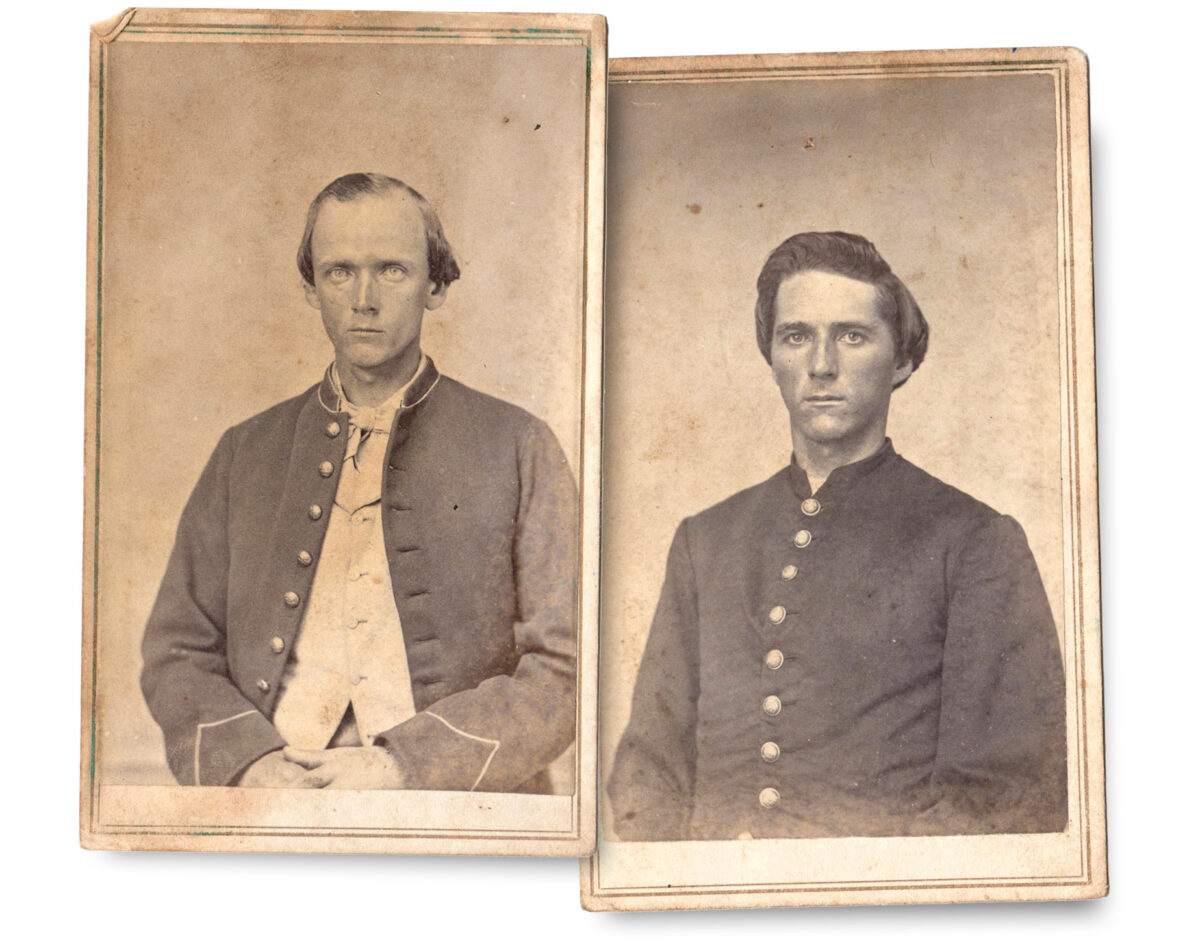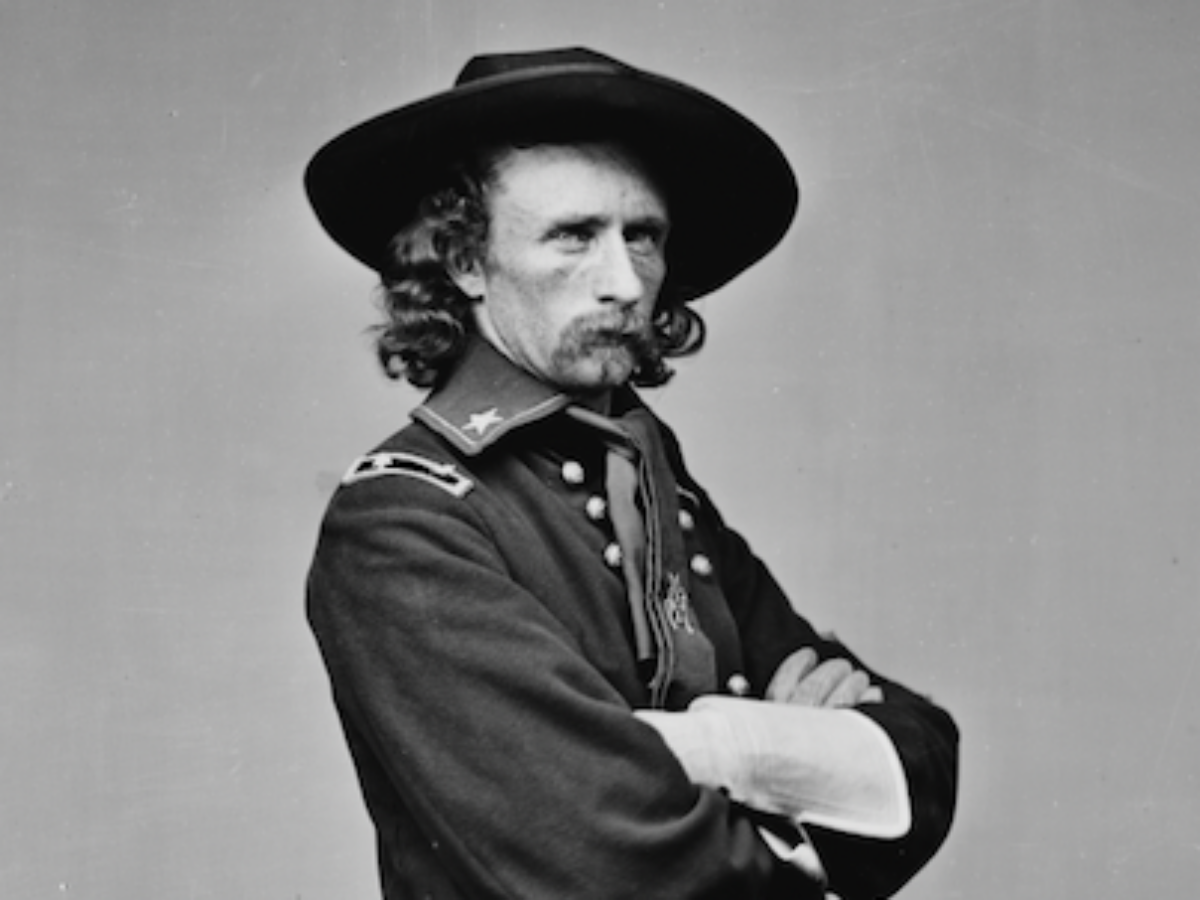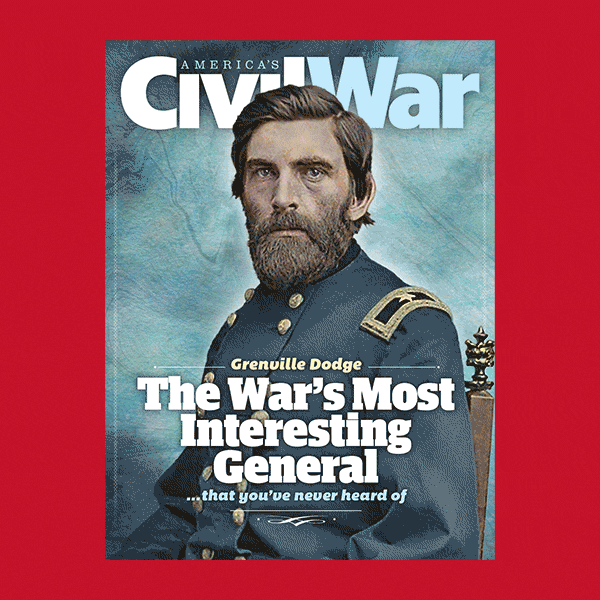The detritus of war was evident along the banks of the Mississippi as the 7th Indiana Cavalry made its leisurely descent down the river from Memphis. On June 17, 1865—with Brig. Gen. Stand Watie’s final formal Confederate surrender less than a week away—the Hoosier State troopers had boarded four steamers headed for Alexandria, La.. It would be a pleasant enough cruise that included a pass of Milliken’s Bend, where Black troops had helped engineer a “bloody” Federal victory on June 6-7, 1863, during the Vicksburg Campaign. “The overflowings of the river were rapidly washing away the earthworks, which the negroes so gallantly defended,” noted 1st Lt. Thomas S. Cogley.
At Natchez, Miss., the convoy stopped for what was intended to be a short respite. Because the pilots were unfamiliar with the river and feared tempting an accident, however, they decided to dock there for the evening. That gave the cavalrymen unexpected free time to write letters back home.
On the move the next morning, they enjoyed some relief from the long journey’s monotony with numerous glimpses of alligators roaming along the water’s edge. One brazen soldier was surprised to see a bullet he fired from his carbine glance off one large reptile’s tough exterior. And though the act of shooting at alligators eventually grew tiresome, once an order was issued forbidding the routine, it led to an inordinate number of “accidental” weapon discharges.
Most of the men were unaware of their final destination. With the war all but over, they figured they were being sent to muster out of service before being allowed to head home. A collection of troops, most working together for the first time, were joining the 7th Indiana in Alexandria. Among these was the 5th Illinois Cavalry, better known as the “Prairie Boys.”
After departing the Mississippi River northwest of Baton Rouge, the boats steamed up the Red River toward Alexandria, located approximately 260 nautical miles from Memphis. Upon their arrival at the juncture of the two rivers, one of the Prairie Boys had noticed “[d]ull, brownish red, soil-laden water flowed into the Mississippi from the Red River.” During the spring, Red River water levels were normally low, making it hard to navigate, and by the summer of 1865 the river had remained drained and sluggish.
Near Marksville, La., the troopers passed the abandoned earthen works at Fort DeRussy. Then, about 50 miles from their destination, they began to notice that the ground was low, flat, and heavily wooded—but also enveloped by a considerable amount of water, essential for growing sugar and cotton. The heat, though, was oppressive at this time of year, and the heavy tree line cut off any potential breeze to cool the travelers down.
Custer Steams Toward Alexandria
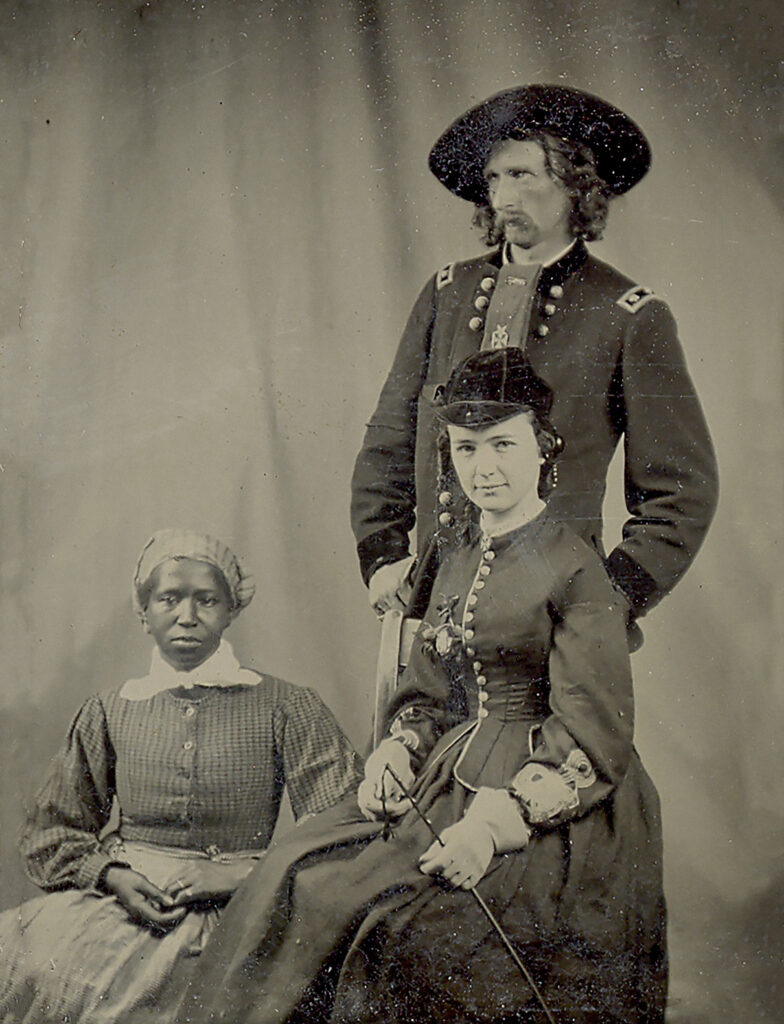
The commander of the group of soldiers assembling in central Louisiana was none other than Maj. Gen. George Armstrong Custer. Accompanied by his young bride, Elizabeth Bacon “Libbie” Custer, the now-famous general had been dispatched to this vicinity by Maj. Gen. Phil Sheridan while stationed in Arlington, Va. Rumors were circulating that a Rebel force had pledged to perpetuate the Confederacy in Texas.
At the time the orders were issued, it was speculated that Confederate President Jefferson Davis was on the way to join Major George Kirby and a large force of Southerners in Texas. Some in the North feared the Confederates might even ally themselves with the French in Mexico and reignite the fighting.
Sheridan assigned Custer to pursue and subdue the enemy gathering in the Lone Star State, but he was initially to assemble at Alexandria and create an effective fighting force.
En route to central Louisiana, the Custers near the end of June had boarded a steamboat in New Orleans. Of their journey, Libbie recalled: “We grew to have an increasing respect for the skill of the [steamboat] pilot, as he steered us around sharp turns, across low water filled with branching upturned tree trunks, and skillfully took a narrow path between the shore and a snag that menacingly ran its black point out of the water.”
As had the troops Custer was about to command, the couple encountered alligators during their voyage, the massive beasts often sunning themselves on sandbars beside the water. Because of the tendency for fired bullets merely to bounce off the creatures’ skin, as the 7th Indiana troopers had already learned, Custer was determined to find a vulnerable spot at which to aim. After a few shots with a rifle borrowed from a steamboat guard, Custer finally succeeded in killing one.
According to Libbie’s attendant, Eliza, the general’s wife had several firsthand opportunities to view alligators at a distance. During the Custers’ boat ride, an unsuspecting African American lad was napping on a sandbar outside Alexandria as an alligator crept toward him. Using a loaned carbine, Custer dispatched the animal with a single shot.
On June 23, the 7th Indiana disembarked at a sugar plantation at the edge of Alexandria. The troopers immediately felt the effects of the harsh sun, the open fields offering no shade. Noted Cogley: “Awnings, both for the men and the horses were constructed of poles and brush brought from the woods, which measurably relieved the suffering…”
“The residents had partially rebuilt the town after [Maj. Gen.] A.J. Smith set [it] ablaze when the Federals withdrew in May 1864,” recalled one 5th Illinois trooper. “A few small, one-story cottages replaced the once thriving town….”
“Low, flat countryside bordered Alexandria, and the smell of rank, decomposing vegetation rose from the banks,” wrote another Prairie Boy. “The hot, tepid air and stagnant water of hundreds of boggy bayous created an oasis for mosquitoes. Clouds of bloodsuckers, including gallinippers [large flying insects with a painful bite] enveloped the men when they landed.”
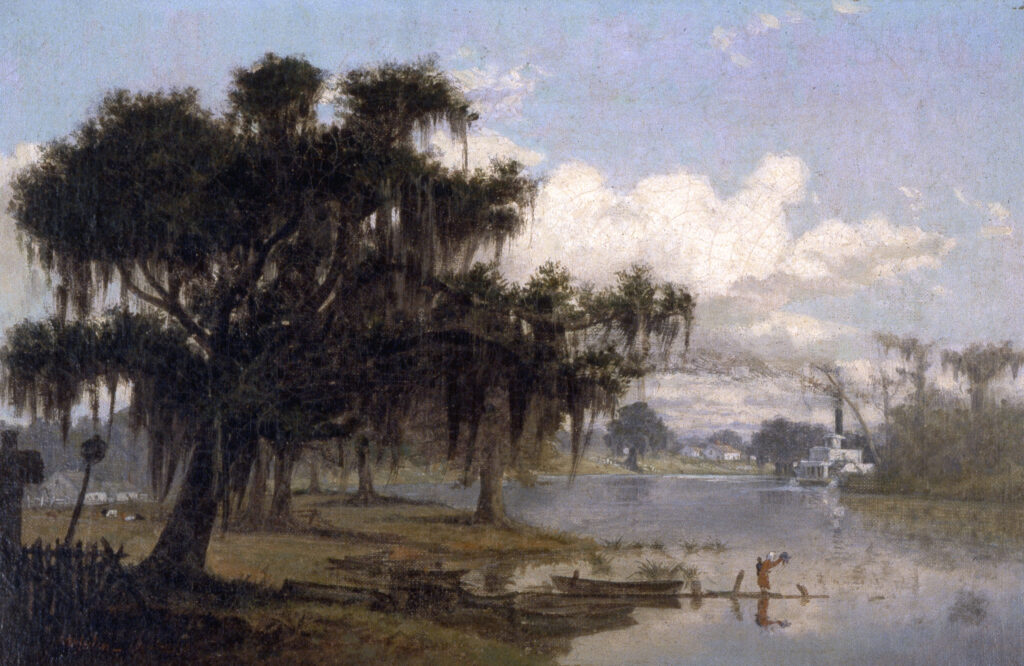
Libbie Custer seemed even less impressed:
“The houses along the Red River were raised from the ground on piles, as the soil was too soft and porous for cellars. Before the fences were destroyed and the place fell into dilapidation, there might have been a lattice around the base of the building, but now it was gone. Though this open space under the house gave vent for what air was stirring, it also offered free circulation to pigs, that ran grunting and squealing back and forth, and even calves sought its grateful shelter from the sun and flies.”
Cogley was more sympathetic to the locals’ plight. “Alexandria, before the war was a small city of about five thousand inhabitants,” he noted. “It acquired some historic interest by being given over to the torch, and the greater and best portion of it destroyed by fire, by General [Nathaniel] Banks, when he left….At the time [our] regiment was there, it contained but about five hundred inhabitants. Old chimneys had not yet fallen, and ruined walls marked the site of former business blocks or palatial residences.”
Unpopular Order
Once the unaffiliated regiments arrived, they were separated into two brigades. The 7th Indiana, 5th Illinois, and 12th Illinois Cavalry comprised the 1st Brigade of Custer’s new division—to be headed by Brig. Gen. George A. Forsyth—and the 1st Iowa Cavalry and 2nd Wisconsin Cavalry formed the division’s 2nd Brigade, under Colonel William Thompson’s command.
Also supporting Custer were two Black regiments, the 76th and 80th USCI. While these units were not formally under the command of the cavalry division, they were under Custer’s direction. Each regiment in the mounted brigades were re-fitted with Spencer carbines and new mounts, except the 2nd Wisconsin, which had already been issued them before arriving after winning a shooting contest. Still, the men were lacking in adequate garrison equipment, and had poor clothing issues.
Libbie described the men of her husband’s command as “[t]ired out with the long service, weary with an uncomfortable journey by river from Memphis, sweltering under a Gulf-coast sun, under orders to go farther and farther from home when the war was over, the one desire was, to be mustered out and released from a service that became irksome and baleful when a prospect of crushing the enemy no longer existed.”
Before the troops could settle, Custer issued what turned out to be an extremely unpopular Special Orders No. 2:
Headquarters Cavalry
Alexandria, Louisiana. June 24th, 1865.
Special Orders No. 2.
Numerous complaints having reached these headquarters of depredations having been committed by persons belonging to this command; all officers and soldiers are hereby urged to use every exertion to prevent the committal of acts of lawlessness, which, if permitted to pass unpunished, will bring discredit upon the command. Now that the war is virtually ended, the rebellion put down, and peace about to be restored to our entire country, let not the lustre of the last four years be dimmed by a single act of misconduct toward the persons or property of those with whom we may be brought in contact. In future, and particularly on the march, the utmost care will be exercised to save the inhabitants of the country in which we may be located from any molestation whatever.
As supplies can be obtained from the supply train when needed, there will be no necessity for foraging upon the country.
No foraging parties will be sent out from this command without written permission from these headquarters and then only to obtain fresh beef and grain, for which payment will be made by the chiefs of the proper departments at these headquarters.
Every violation of this order will receive prompt and severe punishment. Owing to the delays of court martials, and their impracticability when the command is unsettled, it is hereby ordered that any enlisted man violating the above order, or committing depredations upon the persons or property of citizens, will have his head shaved, and in addition will receive twenty-five lashes upon his back, well laid on. This punishment will, in all cases, be administered under the supervision of the Provost Marshal of the command, who is charged with the execution of this order so far as it in his power.
Any officer failing to adopt proper steps to restrain his men from violating this order, or fails to report to these headquarters the names of those violating it, will be at once arrested and his name forwarded to the proper authority for prompt and dishonorable dismissal from the army. The commanding General is well aware that the number of those upon whom the enforcement of this order will be necessary will be small, and he trusts that in no case will be necessary.
He is also confident that those who entered the service from proper motives will see the necessity for a strict compliance with the requirements of this order.
Citizens of the surrounding country are earnestly invited to furnish these headquarters any information they may acquire which will lead to the discovery of any parties violating the forgoing order.
Regimental commanders will publish this order to every man in their commands.
By the command of Major General Custer.
The reaction among the command was swift. One of the displeased was 1st Iowa surgeon Charles H. Lothrop, who wrote:
“On the promulgation of this order no little indignation was manifested by all the troops, which would be natural among all honorable and high-minded men, who from purely patriotic motives responded to the first call for volunteers to defend and maintain the laws of the country, and endured the privations and vicissitudes incidental to four years’ active warfare, to be thus subjected to eternal disgraces without a shadow of law or precedent; and real citizens, entertaining the most malignant bitterness towards federal soldiers.”
Nevertheless, considering the situation facing his men, Custer’s decision had been correct. Indeed, many former Confederate soldiers occupied the surrounding countryside and likely would need only a small provocation to band together and launch attacks on the isolated command. Alexandria’s mayor had surrendered the town only on June 3, mere weeks before Custer’s arrival. Its citizens undoubtedly harbored ill will toward the men in blue, as barely a year had passed since Federal troops had burned their town maliciously on May 13, 1864.
A subsequent wave of desertions was clearly proof Custer had trouble discerning the difference between volunteer soldiers and Regular Army cavalry. In the wake of the order, members of the 5th Illinois began leaving in droves. Although most of these deserters had recently transferred from the 11th Illinois Cavalry, the loss of eight—Joseph Hakin, William H. Barcus, Jesse Cannon, Thomas Ross, John Brown, Thomas W. Wiley, William H. Warren, and Archibald C. Tigner—was somewhat shocking as they had enlisted at the war’s start in 1861.
Another trooper attempting to flee, William A. Wilson, was caught and court-martialed. Other units also reported serious departures from their command. “On several occasions,” Lieutenant Cogley recalled, “nearly the whole command was called out at night, to prevent the threatened desertions of companies and of a regiment.”
While in Alexandria, 15 members of the Prairie Boys alone deserted, and by the time of their October mustering-out, they would be short 75 troopers. Some dangerous incidents even sprang up during this period. “The soldiers did not confine their maledictions to the regular officers of command; they openly refused to obey their own officers,” Libbie reported. “One of the colonels (I am glad I have forgotten his name) made a social call at our house. He was in great perturbation of mind, and evidently terrified, as in the preceding night his dissatisfied soldiers had riddled his tent with bullets, and, but for his ‘Lying low,’ he would have been perforated like a sieve.”
Unfortunately, Custer ended up further exacerbating the friction with his men by directing them to perform menial tasks for his family. In a response to Custer’s report of the strife he was experiencing, Sheridan instructed, “Use such summary measures as you deem proper to overcome the mutinous disposition of the individuals.”
GET HISTORY’S GREATEST TALES—RIGHT IN YOUR INBOX
Subscribe to our HistoryNet Now! newsletter for the best of the past, delivered every Monday and Thursday.
Having become a strict disciplinarian, Custer became enraged when hearing of the trouble in his command. “The conduct of these troops while at Alexandria was infamous, and rendered them a terror to the inhabitants of that locality, and a disgrace to this and any other service,” he would write. “Highway robbery was of frequent occurrence each day. Farmers bringing cotton or other produce to town were permitted to sell it and then robbed in open daylight upon the streets of their town.”
Custer’s command had dissolved into an unruly rabble determined to wreak revenge on the Southern population.
Well after the war, Union 1st Lt. Michael Griffin attempted to explain the problems Custer was having by writing, “[We] had come directly from the Army of the Potomac.” The inner conflict between Custer and his Western troops was part of a rivalry of who was tougher or better than the other: the hard Western trooper or the apparent dandies from the East. As the war played out, the Army of the Potomac veterans were actually just as tough as their counterparts to the West, having had to fight Lee, Jackson, and Stuart for so long. Dutifully, though, the remaining soldiers who decided to stay endeavored to drill together and become a cohesive unit for the upcoming campaign in Texas.
When it came up in conversation, Custer adopted a soothing demeanor to calm Libbie’s concerns about the openly hostile activities around them. Despite the controversies, Custer and his wife endeavored to make their stay in central Louisiana pleasant. Eliza convinced Libbie to get out and visit the elderly former slaves encamped behind Dr. John Casson’s house in Alexandria where the Custers were staying and where General Banks had lodged in 1864. Eventually, Custer joined in these interactions and provided food for the seniors. They also attended church services there.
“It was at Alexandria that I first visited a negro prayer-meeting,” Libbie recalled. “As we sat on the gallery one evening, we heard the shouting and singing, and quietly crept around to the cabin where the exhorting and groaning were going on. Though they were so poor and helpless, and seemingly without anything to inspire gratitude, evidently there were reasons in their mind for the heart-felt thanks [for the nourishment provided by the Custers] as there was no mistaking the genuineness of feeling when they sang [grateful hymns]. They swayed back and forth as they set about the dimly lighted cabin, clapped their hands spasmodically, and raised their eyes to heaven in moments of absorption.”
“a land of enchantment”
The Custers did experience some lighter moments with some of the soldiers not quite as disgruntled as the rest. The 7th Indiana troopers in particular tried to alleviate tensions with their commanding general. After spending long hours in the hot sun drilling, they would often relax by fishing and catching alligators. “Occasionally, a baby alligator from a foot and a half to two feet in length, got on dry land and was taken prisoner by the men,” Cogley wrote.
Aware of Libbie’s fear of the beastly reptiles, Custer proposed to put her at ease by exposing her to one of the smaller ones the Indiana troopers had captured. As Libbie recalled: “[T]he General, thinking to quiet my terror of them by letting me see the reptile ‘close to’ as the children say, took me down to camp, where the delighted soldier told me how he had caught it, holding on to the tail, which is its weapon. The animal was all head and tail; there seemed to be no intermediate anatomy. He flung the latter member at a hat in so vicious and violent a way, that I believed instantly the story, which I had first received with doubt, of his rapping over a puppy and swallowing him before a rescue could come. This pet was in a long tank of water the owner had built, and it gave the soldiers much amusement.” Many times the baby alligators’ parents would come on shore hunting for them, sending the ladies scurrying for safety and the soldiers for their weapons.
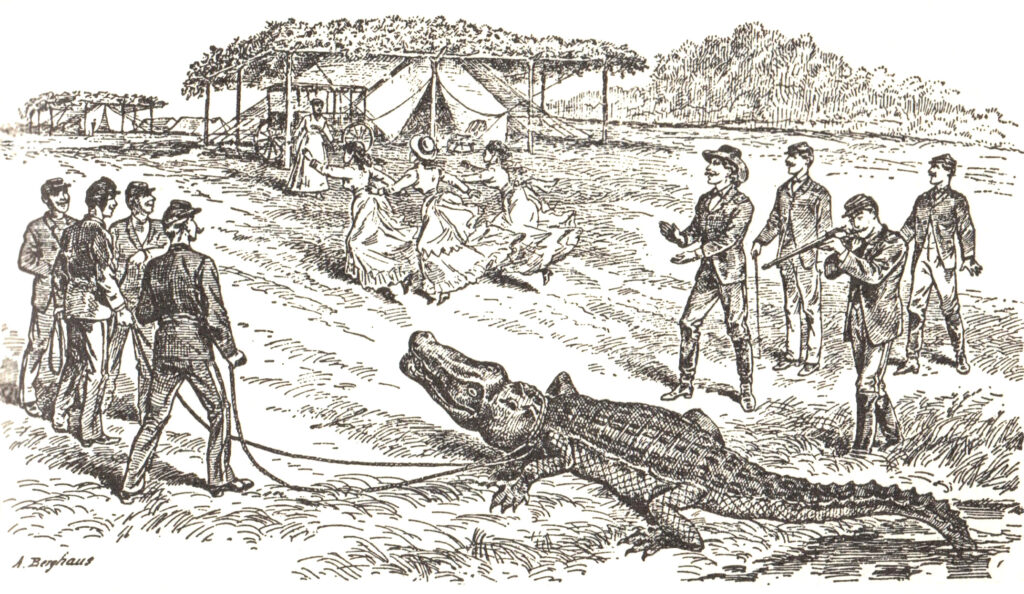
Libbie also documented the excursions into the countryside that she and her husband would make to relieve tensions. The heat was still stifling during daylight so the couple went for evening rides around the area. Libbie’s state of mind eased considerably upon touring the area. “It seemed to me a land of enchantment,” she allowed. “We had never known such luxuriance of vegetation. The valley of the river extended several miles inland, the foliage was varied and abundant, and the sunsets had a deeper, richer colors than any in the North. We sometimes rode for miles along the country roads, between hedges of osage–orange on one side, and a double white rose on the other, growing fifteen feet high. The dew enchanted the fragrance, and a lavish profusion was displayed by nature in that valley, which was a constant delight to us.”
The couple’s explorations brought them to the Louisiana State Seminary and Military Academy, a facility that Libbie noted was still called the “Sherman Institute.”
“General Sherman had been head of this military school before the war, but it was subsequently converted into a hospital,” she elaborated. “It was in a lonely and deserted district, and the great empty stone building, with its turreted corners and modern architecture, seemed utterly incongruous in the wild pine forest that surrounded it.
“We returned to the river, and visited two forts [Forts Randolph and Buhlow] on the bank opposite Alexandria. The General took in at once the admirable situation selected, which commanded the river for many miles. He thoroughly appreciated, and endeavored carefully to explain to me, how cleverly the few materials at the disposal of the impoverished South had been used. The moat about the forts was the deepest our officers had ever seen. Closely my husband studied the plan and formation, he said it would have added greatly to his appreciation, had he known then that the Confederate engineer who planned this admirable fortification was one of his classmates at West Point.”
The general also climbed with his wife atop the walls of Fort Randolph to get a glimpse of Colonel Joseph Bailey’s dam in the river that had saved a Union fleet from destruction the previous year. Additional excursions of the area’s buildings continued, and the Custers also took time to observe the notorious ironclad CSS Missouri, no longer in service and resting idly in the Red River between the two forts.
Across the river in Pineville, Custer stationed the two Black regiments. Tasked to keep the order among citizens, desertions among these troops were fairly low, as morale was better. First Lieutenant Biddle Boggs of the 80th USCI, who also was the acting regimental post quartermaster and ordnance officer, actually bragged to his sister, Sarah Wheldon: “We [Boggs and his wife, Maria] can live much cheaper here than New Orleans. We can buy chickens for 25 cents each, eggs 25 to 30 cents per dozen and butter 50 to 75 cents per pound but rather white and soft.”
The men occupied the cabins at the forts, which had been built the year before by the Confederate garrison. Confederate Colonel Winchester Hall of the 26th Louisiana Infantry mentioned, “The men hastily constructed small cabins with pine boards.”
Although the cabins were dilapidated by the time the USCI soldiers arrived, they were still preferable to the constant burning rays of the sun. Rain, however, provided its own misery for the men who now occupied them. They “leaked badly and flooded frequently,” asserted a former occupant, surgeon Augustus V. Ball of McMahan’s Texas Battery.
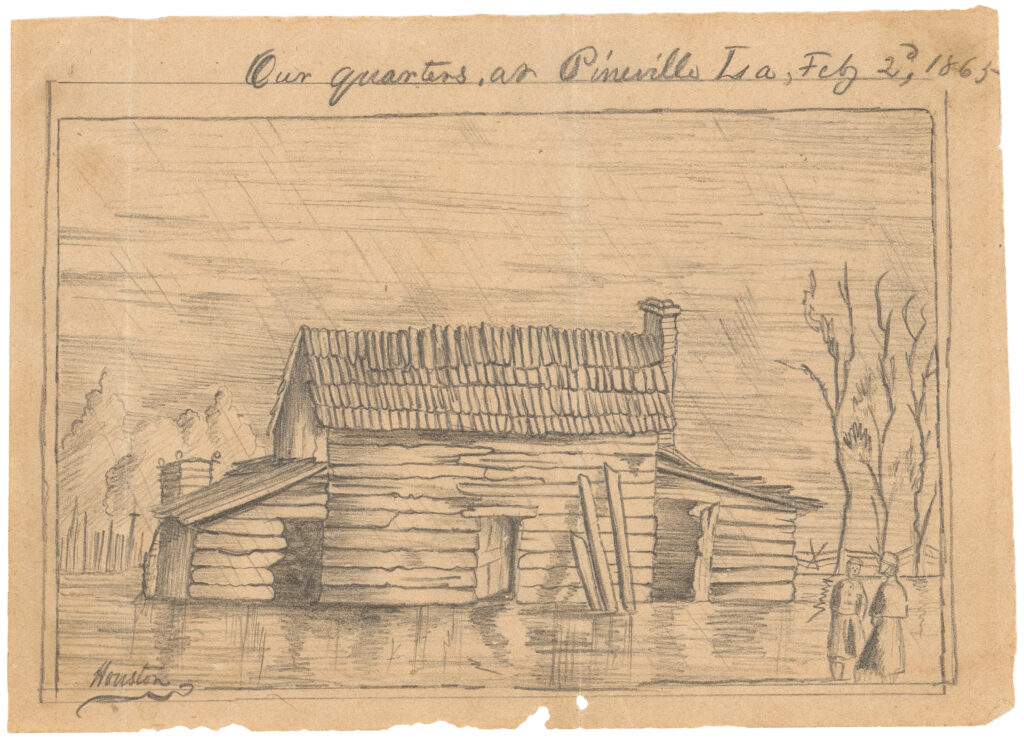
Tensions remained high, and national news did not help the situation. Word reached Alexandria on July 11 that four conspirators in President Abraham Lincoln’s assassination had been hanged on July 7. Upon hearing the news, Boggs quickly jotted down a short letter to his sister to express his thoughts: “Hurrah for [U.S. President] Andy Johnson for hanging Mrs. Surratt and all other assassins. It saves trouble and sends witches where they belong—to Old Nick [Satan]. Who would want to be in Heaven with assassins[?]”
A Disturbing Court-Martial
By far, the most disturbing issue that occurred while stationed in Alexandria was a court-martial of two men. Lincoln’s assassination had been the root of that, as members of the 2nd Wisconsin were livid to be still under the command of Lt. Col. Nicholas H. Dale. In April, Dale had made several inflammatory statements after learning of Lincoln’s death. Told of the tragedy, Dale reportedly replied: “That is all right. The country suffers nothing by such a loss. Abe Lincoln is an imbecile. Abe Lincoln is an old fool.”
The men in the ranks believed their commander had disgraced the Army with his insult. Given the audience of men who had overwhelmingly supported Lincoln’s reelection the previous November, the colonel’s words were ill-advised. Dale would be brought up on charges for his contemptuous and disrespectful language.
“[The] strenuous efforts and endeavors were required of the 2nd Wisconsin troopers to suppress riot and insubordination,” according to one report. On April 18, two days before Lincoln’s funeral, Dale’s court-martial lasted mere hours. Though found guilty, he suffered only a reprimand, leaving the Badger State boys infuriated. Now in Alexandria, they continued to seethe at the trial’s result.
When 2nd Wisconsin Lieutenant Leonard L. Lancaster arrived in Alexandria on July 6, it only exacerbated the situation. Lancaster and his company had been on assignment since early in the year, guarding the railroads in Grenada, Miss., and had not seen their comrades in some time. The Confederate threat in Texas was subsiding, but a possible altercation in Mexico remained possible.
The men of the 2nd Wisconsin roundly welcomed Lancaster’s return, according to 1st Lt. Michael Griffin. They quickly made the lieutenant aware of a petition they were circulating to have Dale removed. “Here is Len; he will go with us,” Griffin remembered the men declaring. Agreeing that Dale’s words about Lincoln were an embarrassment to the unit, Lancaster signed the petition and said, “Yes, where do you want to go? To see Col. Dale? Alright fall in.”
This somewhat lighthearted account by one of Lancaster’s supporters should, of course, be taken with a grain of salt. For one thing, most of the men were highly inebriated at the time, which was never accounted for in any of these unofficial post-action reports.
Lancaster soon had several hundred men following him to Dale’s tent, the mob intent on securing their commander’s resignation. Standing in the way initially was Captain Zelotes P. Coggswell, commanding the guard. Coggswell managed to turn a few away from the direction of Dale’s quarters, spurring Lancaster to call out belligerently, “What in hell is the use of my going unless you follow me?”
Custer in Louisiana
Reaching Dale’s tent, Lancaster and the group would be halted by Captain George W. Nobles, officer of the day. When Nobles asked them to disperse, Lancaster tersely commented: “I am responsible for this thing. Colonel Dale shall not command this regiment. We are going to put him and his baggage on the steamer Hillman and send him home.”
At that moment, Dale burst out of the tent and confronted the angry men. Lancaster repeated his demand for the lieutenant colonel’s resignation and harshly stated, “….if Dale refused, Custer would share the same fate.”
After successfully convincing the drunken soldiers to go back to their camp, Dale had Lancaster brought up on charges. Lancaster’s court-martial was convened July 18. He sat silently through the testimony against him, simply stating when it was his time to speak: “[A]t the time of the riot, [I] was intoxicated and did not know what he said.”
Despite a heretofore spotless service record, Lancaster was quickly found guilty and Custer signed the order for his execution, alongside Private Wilson of the 5th Illinois, who was found guilty of desertion and likewise sentenced to death. Both men languished in a small local jail that was already full of fellow comrades sentenced for lesser offenses.
The inmates would take turns standing in front of the 14-inch square hole above ground level, the only air available in the stifling heat. Lancaster and Wilson were incarcerated until July 28, when they were both to be executed. On the final day, the two men had their wrists bound together and were led to the designated area for their sentences to be carried out. A hollow square of 5,000 of their fellow soldiers surrounded them, and coffins were placed at their sides.
The prisoners had their faces covered with hoods, but as the firing squad was about to carry out the execution, Custer gave a quick nod to the provost marshal, who pulled Lancaster from the danger zone just before the men fired. Young Wilson was not so lucky, as he was killed instantly.
Custer read an order from President Johnson commuting Lancaster’s death penalty, giving him instead a dishonorable discharge and ordering him to be sentenced to three years hard labor. Custer had received the pardon that morning, but upset with Lancaster’s drunken and treasonous behavior, he let the charade of the junior officer’s execution play out to the last seconds. “General Custer told Colonel Dale that he wanted to shoot Lancaster,” said Private Emmet C. West of the 2nd Wisconsin, “If General Custer had any humane feelings in his soul he would have issued an order immediately [stopping Lancaster’s death sentence].”
The next week, Custer received orders to bring his command to Hempstead, Texas. Frustration among the troopers continued, as Custer issued strict marching orders, again not garnering any feelings of loyalty among them. The cavalrymen were mustered out of service in October 1865, most having a life-long dislike of the perceived dandy from the Eastern Theater. Later in life and into the Dakotas, Custer would carry a mockingbird in a small cage as a memento of the summer of 1865.
Richard H. Holloway serves on America’s Civil War’s editorial advisory board. He recently completed writing about the rejuvenation of the Confederate Army of Tennessee at Dalton, Ga., slated for publication in 2023.

